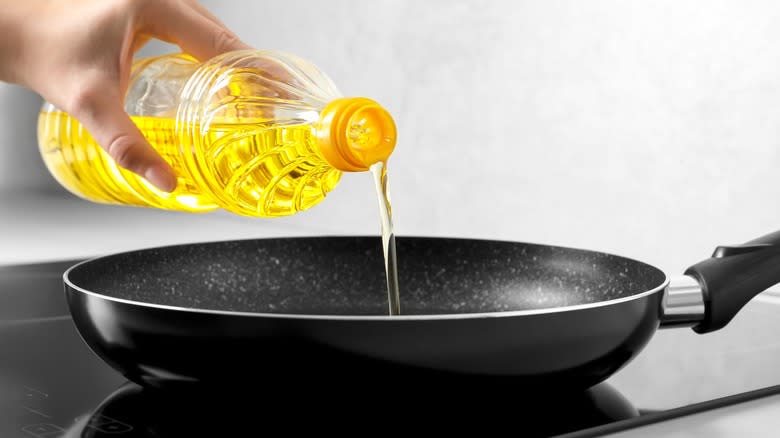What You Should Do With Your Used Cooking Oil (Instead Of Tossing It Out)

While deep-fried foods are tasty, there are downsides to this cooking method, not the least of which is that it can be very wasteful if you only use the oil just one time. You may be pouring a quart or more into the pot, depending on how big the fryer and how large a batch you're cooking, and cooking oil, like everything else at the grocery store, comes at a price. Well, in order not to be wasteful, let's turn to the three R's and see what they advise. The first of these, reduce, would imply that we choose different cooking methods like pan-frying where the oil is absorbed into the food (and hence into our bodies), The second, however, is re-use, and that's something you can definitely do if you want to keep on deep frying.
To store your oil for re-use, you'll first need to let it cool, then strain out any stray bits of cooked breading or batter that may have dropped off as your food was frying. Put it in a jar, cap it, and keep it in the pantry. As to how many times you can re-use it, this is likely going to depend on what kind of oil it is, what types of things you've fried, and how high a temperature it reached. Still, as long as it doesn't look or smell funny, you can keep on re-using it. Once it does turn rancid, though, that's time for the third "R": recycling.
Read more: 12 Little-Known Facts About Salt
You Can Also Recycle The Stuff

Yes, even cooking oil can be recycled for non-food purposes (since, as we all know, pouring oil down the drain is a big no-no). If you're a real DIYer you can put gently used cooking oil to work in your own home, re-purposing it as lamp oil, furniture polish, leather conditioner, general lubricant, or even hair conditioner if you don't mind the smell. If you have a lot of oil to get rid of, though, you might want to call around and try to find a recycling center that accepts the stuff.
The commercial recycling of oil on a large-scale basis does take place, as many restaurants do this with the large amount of oil they have to dispose of. (Just imagine how much oil KFC goes through in a day.) Much of this oil is used to make bio-diesel, which, in turn, can be used to power motor vehicles. A certain amount of it is also repurposed into food for animals. At one point, Whole Foods even used recycled cooking oil to provide the power for a kitchen facility that supplied products to stores in New England, New York, and New Jersey. This experiment only lasted for about five years as the kitchen closed down in 2017, but while it lasted it did help the retailer to reinforce its eco-conscious image.
Read the original article on Mashed.

